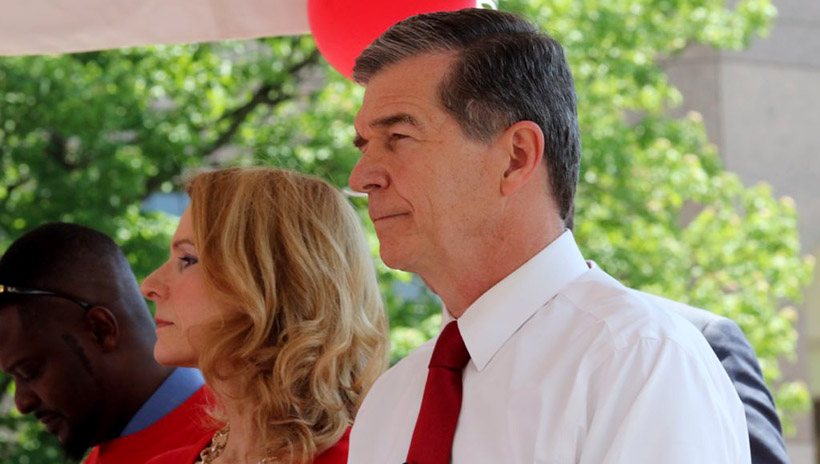Publisher's note: This post appears here courtesy of the Carolina Journal, and written by John Hood, Chairman of John Locke Foundation.
Gov. Roy Cooper, with First Lady Kristen Cooper at his side, helped rally teachers at the May 1 march on Raleigh. (CJ photo by Don Carrington)
Although the North Carolina House has approved its
version of a biennial budget, there's a lot that North Carolinians can't yet know about how much will be spent, and on what, over the next two years. But here's something we can assume with near-certainty: Gov. Roy Cooper will veto it.
Every two years, the governor proposes a biennial budget. The legislature responds by fashioning its own version, which the governor can sign, veto, or let become law without a signature.
The two chambers take turns initiating the legislative phase. In 2019, the House goes first. Its budget
increases General Fund spending by about $700 million in the coming fiscal year, or roughly 3.1 percent. Gov. Cooper's proposal hikes spending by $1.3 billion, or 5.6 percent.
Some advocacy groups and observers fumbled these numbers at first, suggesting that the House budget didn't increase expenditures at all. They were wrong, but it's easy to see how they erred. The legislature has
changed the way it accounts for capital funding. Expenditures for debt service - principal and interest payments on money the state borrowed to build or refurbish buildings and other infrastructure - used to be treated as part of the regular General Fund budget. Now they are part of a dedicated capital fund, along with money for repairs, renovations, and pay-as-you-go projects.
This change was probably a good idea. But unless one accounts for the money the same way across different proposals and fiscal years, the results can be misleading.
Similarly, the tax side of the House budget also generated some confusion. It includes an increase in the standard deduction for North Carolinians who pay income tax and a reduction in the franchise tax, which taxes the value of businesses. But the revenue impact of these tax cuts will be partially offset by new policies designed to collect more sales tax from consumers who make online purchases. The House's net tax cut, then, is a comparatively modest $150 million over two years.
However, because North Carolina is in the process of moving large numbers of Medicaid patients into managed-care networks operated by private insurers, the state will start collecting premium taxes on health-plan enrollees whose claims were previously paid by Medicaid itself. This change will net about $200 million in tax revenue over the next two years, according to
the legislature's fiscal analysts.
Does that mean the House budget, approved by Republicans and opposed by Democrats, is a tax-increase budget? No, not really. North Carolina is contracting out a service that used to be state-run. The objective is to reduce government, not increase it. It would be perverse to treat the application of pre-existing premium taxes to these contractors as a legislated tax hike.
Speaking of Medicaid, this will be the primary nexus of conflict once the Senate produces its budget, the two chambers produce a compromise, and the focus then shifts back to Gov. Cooper. He is committed to a full implementation of the Affordable Care Act in North Carolina, which will require drawing down (borrowed) federal funds to expand Medicaid. Democrats propose doing so explicitly. Some Republicans have
offered an alternative that would use Medicaid dollars to finance a program with some cost sharing and work requirements for recipients.
The GOP-led legislature isn't going to include Medicaid expansion, explicitly or implicitly, in its budget. Cooper will likely veto. Then the two sides will battle it out, even past the start of the 2019-20 fiscal year on July 1. Because of a previously enacted law, state government won't shut down without a new budget. Agencies will continue to operate at the spending levels authorized last year.
Taxpayers would be best served if the legislature ultimately prevails. Current fiscal conditions argue for caution. There
won't be much of a revenue surplus this year, if any, and Medicaid expansions in other states have proved costly. In fact, I think the House's 3.1 percent spending hike is on the high side. But that's just me, your friendly neighborhood conservative, talking.
John Hood (@JohnHoodNC) is chairman of the John Locke Foundation and appears on "NC SPIN," broadcast statewide Fridays at 7:30 p.m. and Sundays at 12:30 p.m. on UNC-TV.


























